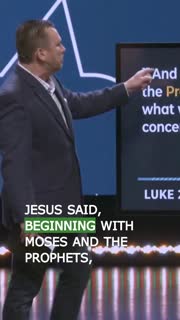Evidence of the Bible: Trusting God's Word
Devotional
Sermon Summary
Bible Study Guide
Sermon Clips
### Quotes for Outreach
1. "I'm telling you, every other book in the world is a paper plate compared to this book. This book is holy. It is set apart. And there are many different religions. They all claim to have different religious writings. But who is the real God? What is the Word of the one true and living God?" [40:06] (19 seconds)
2. "The Bible is historically accurate. Let me give you a verse of Scripture. Psalm 33, 4, For the word of the Lord is right and is true. It's true, but it's also right when it speaks of history or science. And I'll give you examples of that." [43:43] (16 seconds)
3. "The grass withers and the flowers fall, but the Word of our God endures forever. Matthew 24, 35, heaven and earth will pass away. But my words will never pass away." [45:52] (14 seconds)
4. "The heavens declare the glory of God. This book is to reveal God. Reveal God to us. And ultimately, the writer of Hebrews says, He's revealed Himself through His Son, Jesus. And I'm asking you to put your faith in Him. Even though you can't understand it all, know it all, you know He's speaking to you right now." [01:13:23] (24 seconds)
5. "Jesus said, beginning with Moses and the prophets, he explained to them what was said in all the scriptures concerning who? Himself. It's all about Jesus. John 5, 39, you study the scriptures diligently because you think that in them, you have eternal life. These are the very scriptures that testify about me. It's all about Jesus." [01:09:54] (25 seconds)
### Quotes for Members
1. "The evidence for the Bible is overwhelming. And as soon as I get through, you're going to come out and you're going to say something like this. Or you're going to send me an email saying, Oh, but you could have said this and I wish you'd have said that. I'm acknowledging up front. I know. But I've only got 30 minutes. Okay, so I'm highlighting the highlights." [41:24] (19 seconds)
2. "If you can't trust what the Bible says about creation, then why would you trust what it says about salvation? It is right and it's true. It's right and it's true. And it survived all kinds of attacks. They never attacked the Koran. They never attacked the Book of Mormon. Why? Because there's only one book that is the bestseller of all time, and it is the Word of the living God. And that's why the devil hates that book." [44:21] (27 seconds)
3. "The Bible's filled with them, and I'm gonna give you just some today. And let me just tell you, if you can't trust what the Bible says about creation, then why would you trust what it says about salvation? It is right and it's true. It's right and it's true. And it survived all kinds of attacks." [44:21] (16 seconds)
4. "The Bible was written over 1,500 years by 40 different people who lived in over a dozen different countries. Many of them never met. Knew one another. They couldn't say, what are you going to say about this? No, what are you going to say about this? No, it didn't happen. Three different continents over three different languages. And there's one theme. One message. It's not 66 individual books. It is one book. And it's all about Jesus." [01:06:38] (27 seconds)
5. "The Bible prophesies in Jeremiah 50-13 that Babylon would be desolate, a heap of ruins. It was the greatest city of its day when it was written. Jesus prophesied in Luke 19-43, the day will come, that your enemies will build an embarkment against you. They will not leave one stone on the other. And of course, Jerusalem was attacked and the temple was destroyed in 70 AD." [58:34] (23 seconds)
Ask a question about this sermon
1. "I'm telling you, every other book in the world is a paper plate compared to this book. This book is holy. It is set apart. And there are many different religions. They all claim to have different religious writings. But who is the real God? What is the Word of the one true and living God?" [40:06] (19 seconds)
2. "The Bible is historically accurate. Let me give you a verse of Scripture. Psalm 33, 4, For the word of the Lord is right and is true. It's true, but it's also right when it speaks of history or science. And I'll give you examples of that." [43:43] (16 seconds)
3. "The grass withers and the flowers fall, but the Word of our God endures forever. Matthew 24, 35, heaven and earth will pass away. But my words will never pass away." [45:52] (14 seconds)
4. "The heavens declare the glory of God. This book is to reveal God. Reveal God to us. And ultimately, the writer of Hebrews says, He's revealed Himself through His Son, Jesus. And I'm asking you to put your faith in Him. Even though you can't understand it all, know it all, you know He's speaking to you right now." [01:13:23] (24 seconds)
5. "Jesus said, beginning with Moses and the prophets, he explained to them what was said in all the scriptures concerning who? Himself. It's all about Jesus. John 5, 39, you study the scriptures diligently because you think that in them, you have eternal life. These are the very scriptures that testify about me. It's all about Jesus." [01:09:54] (25 seconds)
### Quotes for Members
1. "The evidence for the Bible is overwhelming. And as soon as I get through, you're going to come out and you're going to say something like this. Or you're going to send me an email saying, Oh, but you could have said this and I wish you'd have said that. I'm acknowledging up front. I know. But I've only got 30 minutes. Okay, so I'm highlighting the highlights." [41:24] (19 seconds)
2. "If you can't trust what the Bible says about creation, then why would you trust what it says about salvation? It is right and it's true. It's right and it's true. And it survived all kinds of attacks. They never attacked the Koran. They never attacked the Book of Mormon. Why? Because there's only one book that is the bestseller of all time, and it is the Word of the living God. And that's why the devil hates that book." [44:21] (27 seconds)
3. "The Bible's filled with them, and I'm gonna give you just some today. And let me just tell you, if you can't trust what the Bible says about creation, then why would you trust what it says about salvation? It is right and it's true. It's right and it's true. And it survived all kinds of attacks." [44:21] (16 seconds)
4. "The Bible was written over 1,500 years by 40 different people who lived in over a dozen different countries. Many of them never met. Knew one another. They couldn't say, what are you going to say about this? No, what are you going to say about this? No, it didn't happen. Three different continents over three different languages. And there's one theme. One message. It's not 66 individual books. It is one book. And it's all about Jesus." [01:06:38] (27 seconds)
5. "The Bible prophesies in Jeremiah 50-13 that Babylon would be desolate, a heap of ruins. It was the greatest city of its day when it was written. Jesus prophesied in Luke 19-43, the day will come, that your enemies will build an embarkment against you. They will not leave one stone on the other. And of course, Jerusalem was attacked and the temple was destroyed in 70 AD." [58:34] (23 seconds)










